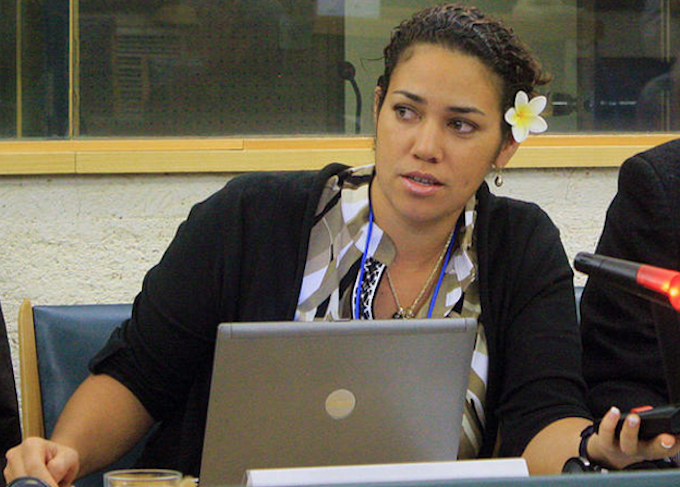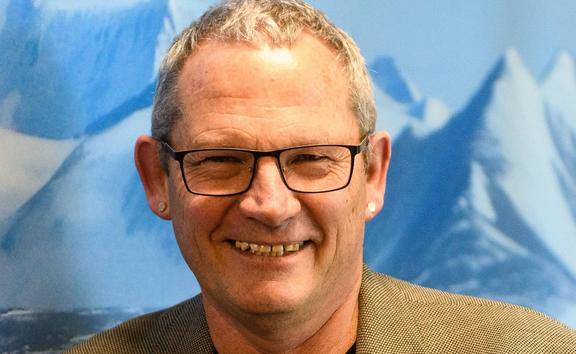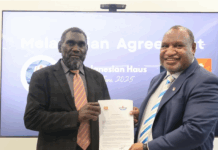
By Dominic Godfrey, RNZ Pacific Journalist
The Pacific’s coral reef systems and coastal fisheries are set for extinction if wealthy nations don’t drastically and immediately cut greenhouse gas emissions.
An Intergovernmetal Panel on Climate Change report released on Monday night pegs temperatures hitting as much as 3.9 degrees above industrial times, twice the 1.5 degree target.
Anything above 2 degrees is viewed as a death-knell in the Pacific.
- READ MORE: IPCC report: ‘Last gasp’ warning on climate response for NZ, the world
- LISTEN: Coral reef systems set for extinction, next 10 years ‘critical’
- LISTEN: Latest IPCC report reminder to cut emissions – youth
- The full sixth IPCC report
A New Zealand climate scientist is one of the IPCC report’s lead authors and said it provides more certainty about our dire climate trajectory

“1.5 degrees is likely to be reached and possibly exceeded within the next 20 years, between 2030 and 2040 let’s say, so the length of time we’ve got left to really take action to stop from the warming at something like 1.5 degrees or certainly below 2 degrees, is shorter than we were thinking,” he said.
Dr Renwick said immediate and drastic action needed to be taken to ensure a pathway to zero emissions by 2050 and to be half way there by 2030.
He said only then will we get close to the 1.5 degree target.
A senior adviser at the regional science agency, the Pacific Community’s Coral Pasisi, said it was looking grim and the next 10 years were critical.
“All of the assessments done to date suggest that anything above 1.5 degree warming is going to be dire. And up until recently, even with the best commitments made by countries, within the next 10 years we’re likely to exceed the 2.5 degrees in warming.”
Pasisi said Pacific Community assessments on coastal fisheries and coral reef systems showed warming above 1.5 degrees cuts by 80 percent the ability of those systems to maintain good health.
She said a total collapse would be likely.
“We know that above 2 degrees, we are going to see 99 percent, up to 99 percent coral reef death rates which affect the whole ecosystem on which Pacific populations depend for their food security.”
Greenpeace Pacific’s Joseph Moeono-Kolio said the latest report indicated temperature rise is on a trajectory that could reach 3.9 degrees. He said despite ongoing warnings, emissions were getting worse and so were the prospects for the planet.
“If things don’t translate into actual implementable policies that are in line with the one-point-five target of the Paris Agreement, we’re actually headed towards warming of about 3.9 to 4 degrees which suffice to say would be absolutely catastrophic for the Pacific and the world at large,” Moeono-Kolio said.
He said the flooding in China and Europe, record temperatures across the northern hemisphere and wildfires raging out of control — was with a temperature rise at 1.1 degrees above pre-industrial times.
Moeono-Kolio said nations must commit to meaningful reductions at November’s global climate conference the COP26 in Glasgow.
“We need oil, gas and coal completely out of the electricity system by 2030 and then going net-zero by 2035 which places us at the best possible chance of reaching, of not superseding the 1.5 threshold.”
Reading the latest IPCC report due for release tomorrow and…I think I’m gonna be sick.#ClimateEmergency
— Auimatagi Joe Moeono-Kolio 🌴 (@JoeMoeonoKolio) August 7, 2021
The Marshall Islands climate envoy Tina Stege agrees.
She said the droughts, worsening storms and rising seas should be a clarion call to the wealthiest 20 nations that produce 80 percent of greenhouse gas emissions.

“And of course targets alone aren’t enough. We need to see changes in the real economy, and governments making decisions that encourage markets to shift with the times. Two very obvious things that come to mind: phasing out fossil fuel subsidies and ending coal – steps that could drastically reduce emissions and enable a transition to a green economy.”
If the rhetoric is not met with political action, the world will remain on track for a temperature and sea-level rise that has not even been modelled.
For low-lying Pacific countries, it would likely mean their complete disappearance.

“There’s no time left for empty promises and world leaders need to work harder to cut emissions,” according to a Pacifc climate change activists.
Brianna Fruean from the group Pacific Climate Warriors told Morning Report the findings were alarming but not unexpected and there’s no time left for inaction.
“We are past the time of our leaders saying “oh yep, this is existing, we aim to do this in in the far future, I think we don’t have time for that and we don’t have any space for those types of empty statements anymore.”
The IPCC report said deadly heatwaves, powerful hurricanes and other weather extremes happening now, are likely to become more severe.
This article is republished under a community partnership agreement with RNZ.















































